Five hats, one flag - Sino-Soviet (Russia) relations since 1949
Author's note: The novel coronavirus epidemic has spread globally, and it has also affected China's relations with partner countries. Sources from Russia said that the Moscow authorities’ law enforcement actions against Chinese people while monitoring the epidemic have caused dissatisfaction among Chinese people. This article reviewing the history of Sino-Soviet (Russia) relations from the perspective of language and imagery was written in 2019 and published on FT Chinese website on September 17, 2019, with a memo.
If you talk about the relationship between countries, warmth and affection, and even love and hatred, the following stories can be called strange. Here are five hats that debuted:
"Soviet Big Brother";
"Khrushchev revisionism";
"Social imperialism";
"Reform and New Thinking";
"Strategic Partner";
There is also a banner that travels through time and space:
"Leninism".
Let's start with the first hat.
i. "Soviet Big Brother"
Related phrases: "Stalin", "Mao Zedong", "One-sided", "Leading the Soviet Union", "The Soviet Union's today is our tomorrow"
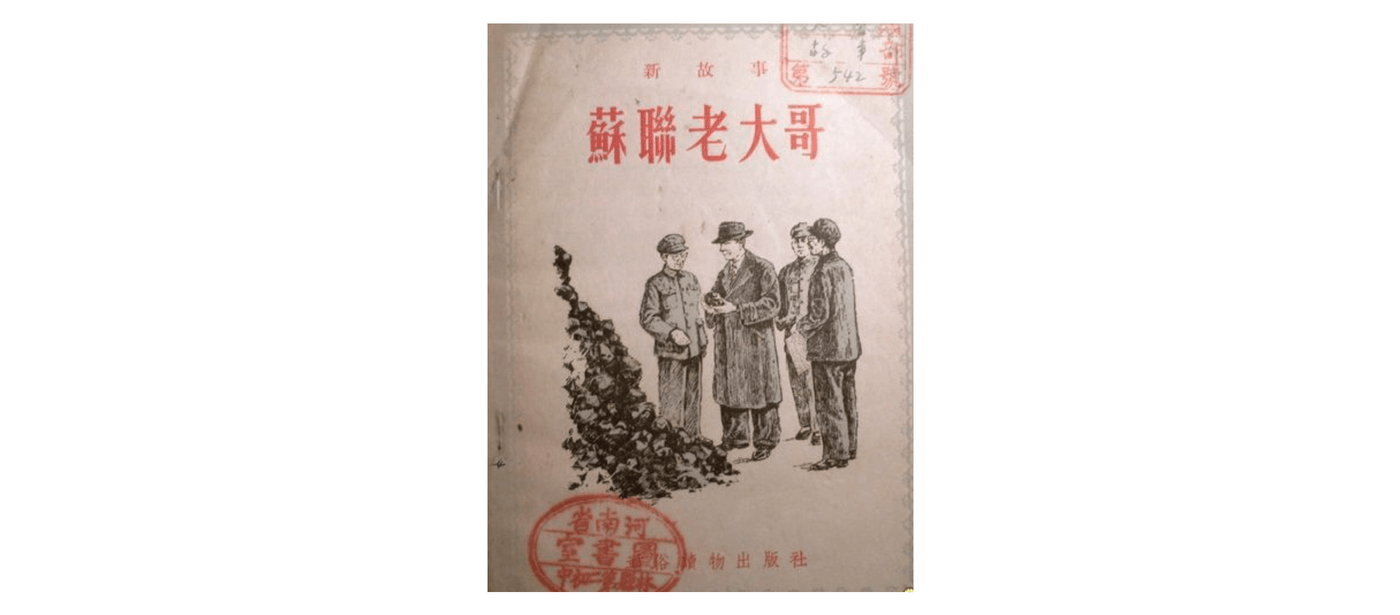
The "big brother" here is actually an old Chinese term, an honorific title, not the intimidating "big brother" in "1984".
The term "Soviet Big Brother" appeared before 1949. I found the "War Guardian" published by the Jinan Garrison and Political Department of the People's Liberation Army on October 25, 1949. This newspaper is almost a special issue for Sino-Soviet friendship.
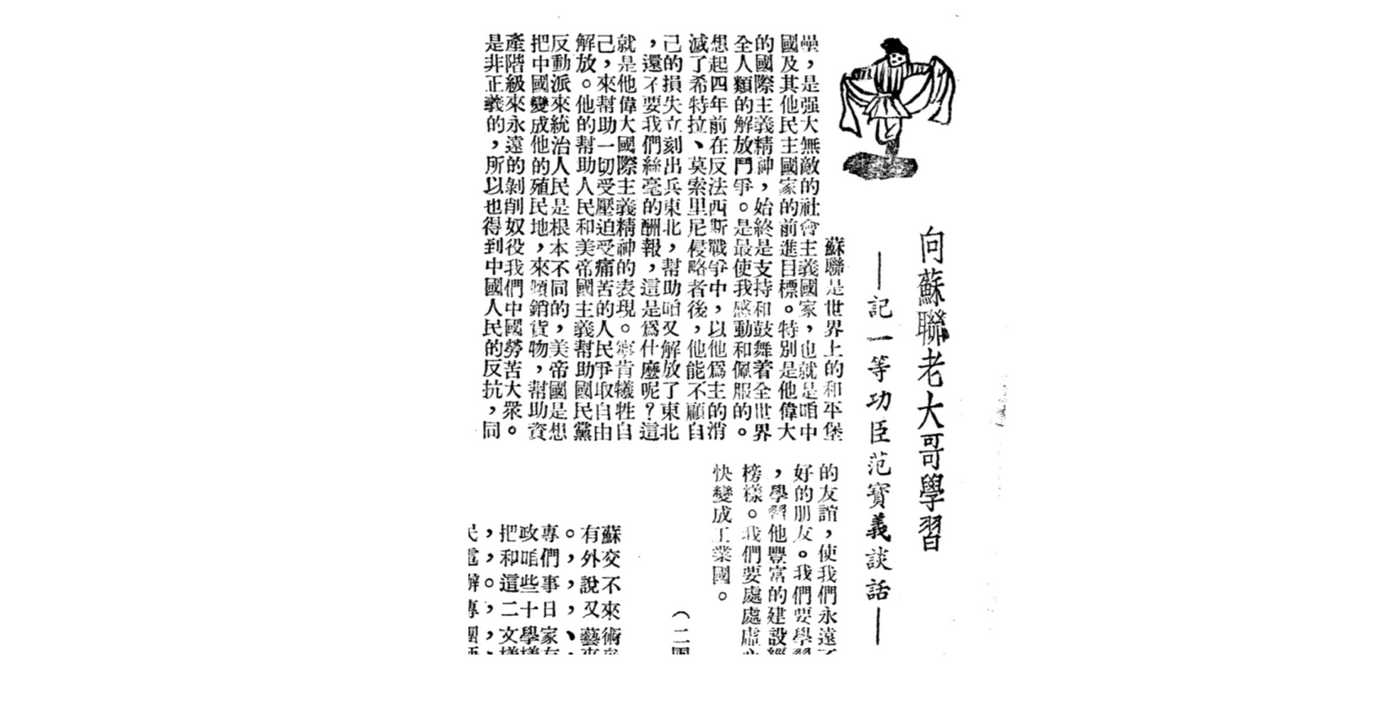
Fan Baoyi, a first-class hero, praised the Soviet Union for establishing diplomatic relations with the People's Republic of China for the first time in the talk "Learning from the Big Brother of the Soviet Union", saying that "he is our best friend". Another small poem signed "Zhang Kezhong of the Second Regiment and Three Battalions", titled "Towards the Side of the Soviet Union":
One side, one side. Chairman Mao, tell us. ...We are building, we lack experience, we must, and we must turn aside, ...hand in hand, shoulder to shoulder, united, and boundless...
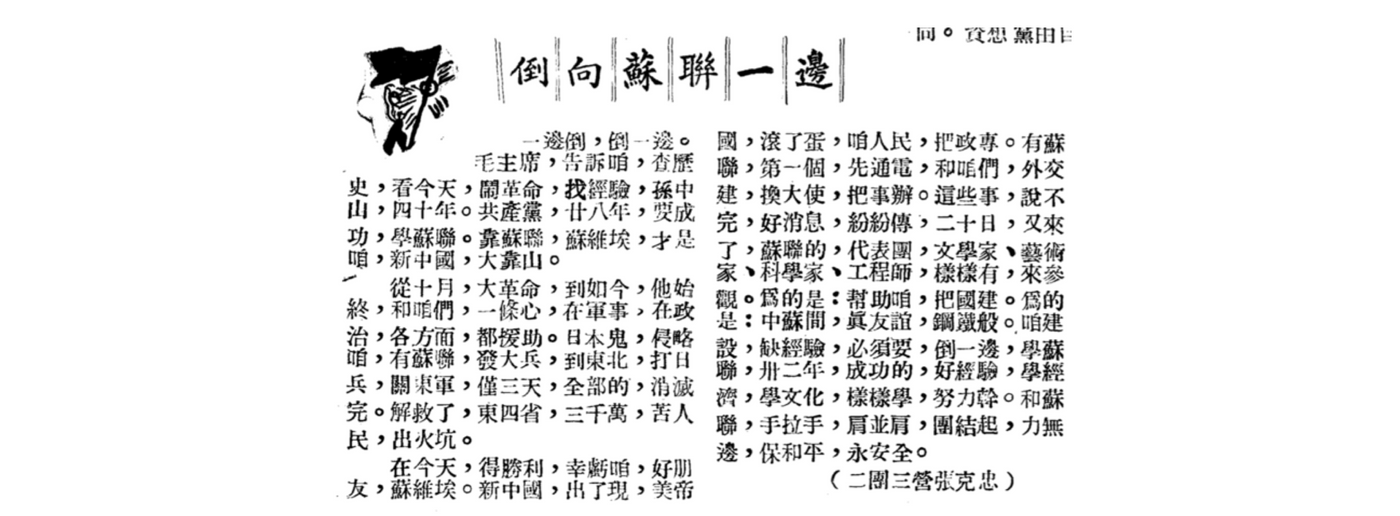
On February 14, 1950, the Sino-Soviet Treaty of Friendship, Alliance and Mutual Assistance was signed. Today is Valentine's Day.
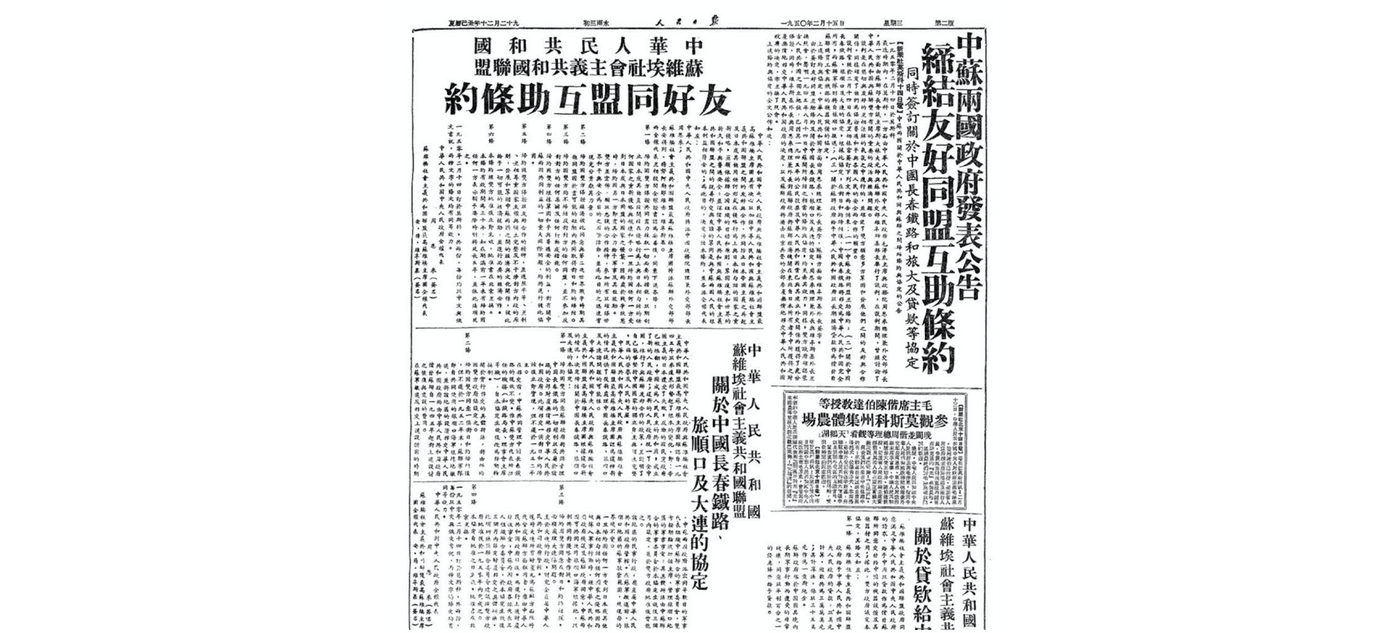
The People's Daily, which reported the news, put a large photo of Stalin and Mao Zedong on the front page:
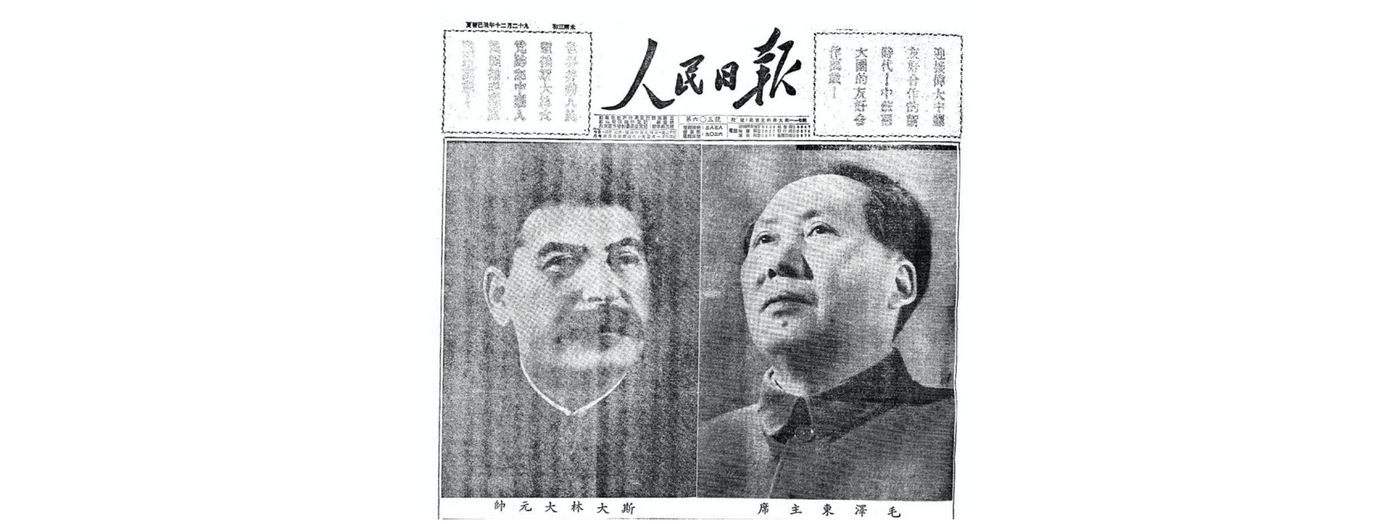
"Thank you Big Brother, learn from Big Brother", "Today in the Soviet Union is our tomorrow", were the media terms at that time. On January 1, 1956, the People's Liberation Army Daily started its publication. Two photos on the front page had Soviet elements: the accordion, and the soldier's boat-shaped cap.
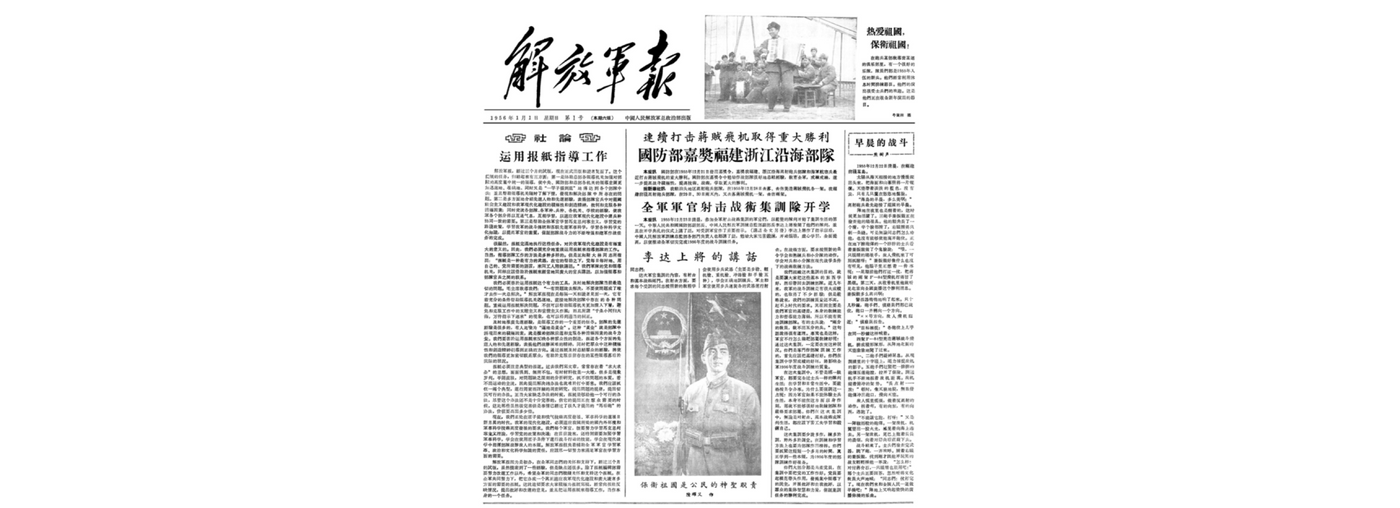
To study Sino-Soviet relations, one must read "The History of Sino-Soviet Relations" (Xinhua Press, 1997, hereinafter referred to as "History") written by Shen Zhihua, Yang Kuisong, Shen Zhihua, Li Danhui, and Luan Jinghe. According to the textual research of the "Historical Outline", in the 1950s, from the military assistance of the Korean War, economic recovery, large-scale construction to the development of atomic bombs and missiles, the "Big Brother of the Soviet Union" gave China huge support. China received a considerable amount of equipment, loans and scientific and technological materials from the Soviet Union. In the 12 years after 1949, 18,000 Soviet experts worked in China. During China's first five-year plan, the Soviet Union gave China half of the total scientific and technological aid to socialist countries. Thanks to the help of the Soviet Union, China's "First Five-Year Plan" was fully completed.
Brotherly sympathy was one aspect of Sino-Soviet relations at that time. The other side is discord, suspicion, and exchange of interests. The conclusion of the Treaty of Friendship, Alliance and Mutual Assistance was the result of Mao Zedong and Stalin's "wrench". China forced the Soviet Union to give up its interests in the Northeast. The price China paid for the Sino-Soviet alliance was extremely high. China was forced to be involved in the Korean War at a time when all its wastes were waiting to be rebuilt. China's exchange of aid for the Soviet Union had to include the 200,000 flesh and blood who died in North Korea.
The "honeymoon period" of Sino-Soviet relations was about five years from 1954 to 1958. During this period, the new Soviet leader Khrushchev's support for China increased several times (such as nuclear aid). And every time it warms up, it is closely related to Khrushchev's support from the CCP when he encounters a crisis within the socialist camp and a crisis in the struggle within the party.

Behind this report in the July 5, 1957 edition of the People's Daily, there is a major historical fact. Previously, due to China's political support for the Soviet Union in the events of Poland and Hungary, the Soviet Union's cautious attitude towards helping China in the development of atomic bombs and missiles has loosened. When negotiations between the United States and the Soviet Union on nuclear bans and restrictions on nuclear weapons deepened, and the Soviet Union's restrictions on China's peaceful use of atomic energy and nuclear weapons development became more and more clear, the Soviet Union had an intra-party struggle in June. After Khrushchev subdued his opponent with extraordinary means, he urgently needed the support of the CCP. Mao Zedong responded quickly and supported it immediately, and decided to publish the full text of the resolution of the CPSU in the People's Daily. Mao Zedong sent help in the snow, and Khrushchev reciprocated, and immediately showed enthusiasm for helping China's "two bombs". In October, China and the Soviet Union formally signed the "Agreement on the Production of New Weapons and Military Technology and Equipment and the Establishment of a Comprehensive Atomic Energy Industry in China" ("History" P191-193).
During this period, Sino-Soviet friendship is the overall situation that China's destiny is tied to. The friendship between ordinary people is real, and the influx of Soviet culture has cultivated a generation of Soviet complexes. Those who had independent thinking, and who had criticized or even outspoken criticism of "Soviet Big Brother" were labeled as rightists for "attacking the Soviet Union" in 1957.
China and the Soviet Union formed an alliance, and the Soviet Union was the leader of the alliance. "Leading by the Soviet Union" frequently appeared in the newspapers. I found that as early as 1951, there was a saying in Chinese newspapers that "the Soviet Union is the big brother, and we China is the second brother" (Guo Moruo: "Glory belongs to scientific researchers", the first issue of "Science Bulletin" in 1951). After Stalin's death, represented by Mao Zedong, the status of the "second brother" became increasingly prominent. According to Shen Zhihua, there was a saying at the time: There was only one theoretician and philosopher in the communist movement all over the world, and that was Mao Zedong, while Khrushchev was just a doer, a doer who grew corn ("The History Outline"). P244).
Looking at each other, the second brother is eager to change the status quo of "a big political country and a small economic country", trying to create another model outside the big brother's model. After the second half of 1958, the relationship between the eldest brother and the second brother became increasingly delicate. The honeymoon ends here.
The term "Soviet Big Brother" first appeared in the People's Daily on September 22, 1949, and was last used on August 10, 1961. The life cycle is nearly 12 years.
II. "Khrushchev revisionism"
Related words: "national state", "all people's party", "peaceful coexistence and peaceful transition and peaceful competition", "potatoes and beef"
During my visit to Germany in 2018, I used to go to a small restaurant and like the bisque "Goulasch" there. How do I know that this "Gulash" has a lot to do with "Khrushchev revisionism".
The term "revisionism" has many connotations. In the context of the international communist movement, it first refers to the thoughts of Bernstein, Kautsky and others in the Second International; after 1949, the CCP and the Soviet Union have criticized the "Browder revisionism" of the United States and Yugoslavia. "Tito revisionism". The People's Daily once specifically explained the term "revisionism": "Revisionism is a philosophical theory of reformists in the labor movement." (December 25, 1956, 6th edition)
By the 1960s, it was Khrushchev's turn to wear the "revisionist" hat.

This 1959 photo of Mao Zedong and Khrushchev is a bit interesting. The eldest brother and the second eldest brother seemed to be competing in an arena.
During the honeymoon period, the two fought each other many times. Mao was a troublemaker and was good at creating tension. What annoyed Khrushchev the most was that Mao planned the bombardment of Kinmen. Not only did he keep it a secret, he also used his visit to China to give the world the illusion of a "Sino-Soviet complicity". He walks on his front feet, and Mao fires a thousand cannons on his hind feet. Mao succeeded in creating troubles between the United States and the Soviet Union to create tension in the Taiwan Strait, and He swallowed the bitter fruit.
The so-called "Khrushchev revisionism" is called "Khrushchevism" in the West. To cite the major points, one is to liquidate Stalin’s dictatorship (Mao is both happy and worried about this); the second is to ease relations with the West; "peaceful transition". Here is the Chinese version of Khrushchev's various speeches in 1959:
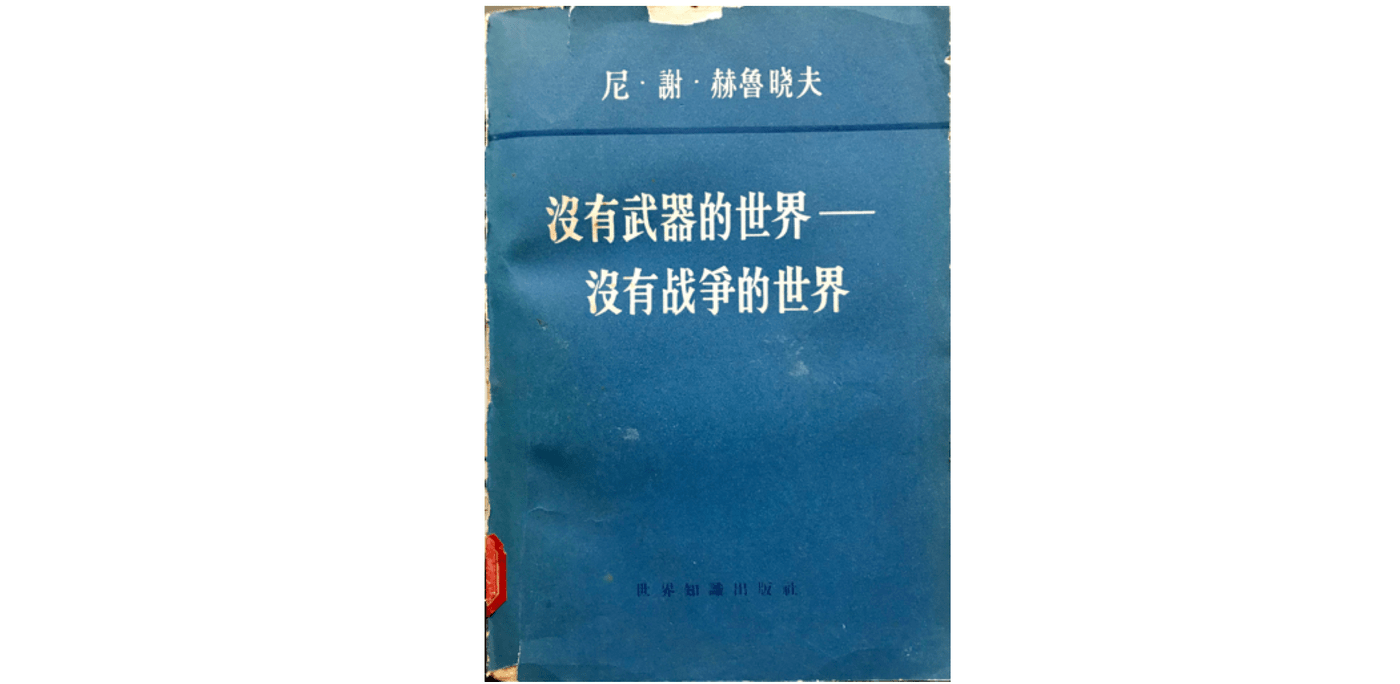
Khrushchev's words and deeds made Mao unhappy, but the fuse that led to the breakdown of the relationship between the two countries was closely related to China's internal affairs. In 1958, the ambitious Mao Zedong launched the Great Leap Forward and the People's Commune Movement. He attempted to use the whole country's militarized system to overtake cars on bends, but was severely frustrated and brought China into a great famine. Within the party, the Great Leap Forward was criticized by Peng Dehuai, the international communist camp, and the Soviet Union questioned. In 1959, Mao could not endure this kind of "internal and external attack".
The last time Khrushchev's photo appeared in the People's Daily was on January 16, 1960:
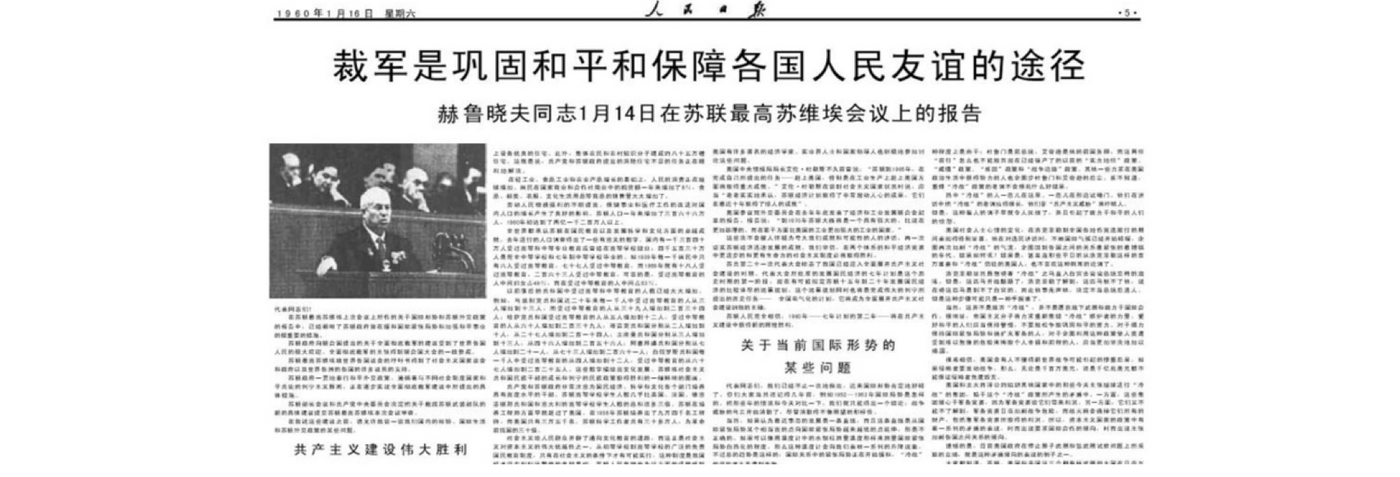
Mao initially referred to He as "semi-revisionist", but the Sino-Soviet disagreement over a series of events was irreversible; and the adjustment of domestic policies (correction to the left) challenged Mao. In the fall of 1962, he began to fight back. Talking about the class struggle internally, criticizing revisionism externally—this is really the same thing about power. Mao was a strategist who was good at setting issues. The word "xiu" was firmly grasped by him and became the button of political struggle.
In May 1963, Mao presided over an enlarged meeting of the Central Standing Committee in Hangzhou. On October 5, 1963, the acronym "anti-revision" appeared for the first time in the People's Daily, and on February 13, 1964, "anti-revision" appeared for the first time.
From September 6, 1963 to July 14, 1964, the CCP, in the name of the People’s Daily and the editorial office of Red Flag Magazine, successively published nine long articles criticizing Soviet revisionism, known in history as the “Nine Commentaries”, namely: “The Communist Party of the Soviet Union” The Origin and Development of the Differences Between the Leader and Us", "On the Stalin Question", "Is Yugoslavia a Socialist Country?" "Apologetics of Neocolonialism", "Two Lines on the Question of War and Peace", "Two Fundamental Opposite Policies of Peaceful Coexistence", "CPSU Leaders Are the Greatest Separatists of Our Time", "Proletarians" Class Revolution and Khrushchev Revisionism", "On Khrushchev's False Communism and Its Lessons in World History". The last two articles are named and praised by the title.


In China, whoever is listed as the object of criticism is immediately flooded with sewage. After 1963, the image of the Soviet Union was so vicious that even elementary school teachers said in class that we are in difficulty today because the Soviet Union forced us to repay our debts. Shen Zhihua said that he did not see any records of historical documents about chasing and repaying debts ("Historical Compendium" P144). There is also a widely circulated saying that He defined communism by "goulash with potatoes". "Nine Commentaries" said:
... Khrushchev's "communism" is the "communism of goulash", it is the "communism of the American way of life"...
When Hearst read this sentence, he would "be puzzled by the second monk." This term was originally translated incorrectly. At the end of 1959, he visited Hungary and joked at a mass meeting that when it came to communism, Hungary could eat gulash regularly. Goulasch is a Hungarian dish, aka "Goulasch", the beef and potato bisque I've had in Germany. The editor of Xinhua News Agency's "Reference News" mistranslated it as "stew beef with potatoes" in a hurry, but it was unexpectedly popular (People's Daily Online: http://cpc.people.com.cn/GB/64162/64172/64915/4600171.html ) and became an important target for criticizing "Khrushchev revisionism".
In 1965, Mao Zedong wrote the poem "Nian Nujiao. Birds Questions and Answers":
Kunpeng spread his wings, 90,000 miles, and flipped the swinging horns.
Carrying the blue sky and looking down, it is a city on earth.
The artillery fire continued, and bullets were everywhere, scaring the puppies.
What's up, oops, I'm going to leap.
When I asked you where to go, Queer replied: There is Xianshan Qiong Pavilion.
I didn't see Yuelang the year before, and signed three agreements.
There is food, potatoes are cooked, and beef is added.
No fart! Try to see the world turned upside down.
The word was later composed and became a chorus with symphony accompaniment. When they sang "The potatoes are cooked, let's add beef", a man suddenly stopped drinking in a high-pitched and agitated manner: "Don't - let it go! Fart!" The chorus then reached a climax, "Try to see the world turn upside down."
The world turned upside down. For China, the biggest overturn was the Cultural Revolution. The connotation and denotation of "Khrushchev revisionism" expanded rapidly. The muzzle of criticism turns from the outside to the inside.

During the Cultural Revolution, President Liu Shaoqi was beaten to death. When the name was not made public, the party newspaper referred to it as "China's Khrushchev". After the public roll call at the end of 1968, it was also referred to as "Liu Xiu".
Criticism of "Khrushchev revisionism" is undoubtedly a public opinion preparation for the Cultural Revolution. These high-pitched and high-pitched arrogance, strong words and rationale, but the literary talent is soaring, which is not comparable to the writing of the younger generation Mao Zuo.
From the perspective of discourse analysis, the nearly 200,000-word "Nine Commentaries" can be regarded as a precious "corpus of Sino-Soviet debates" (Chinese side). The word frequency cloud map shows:
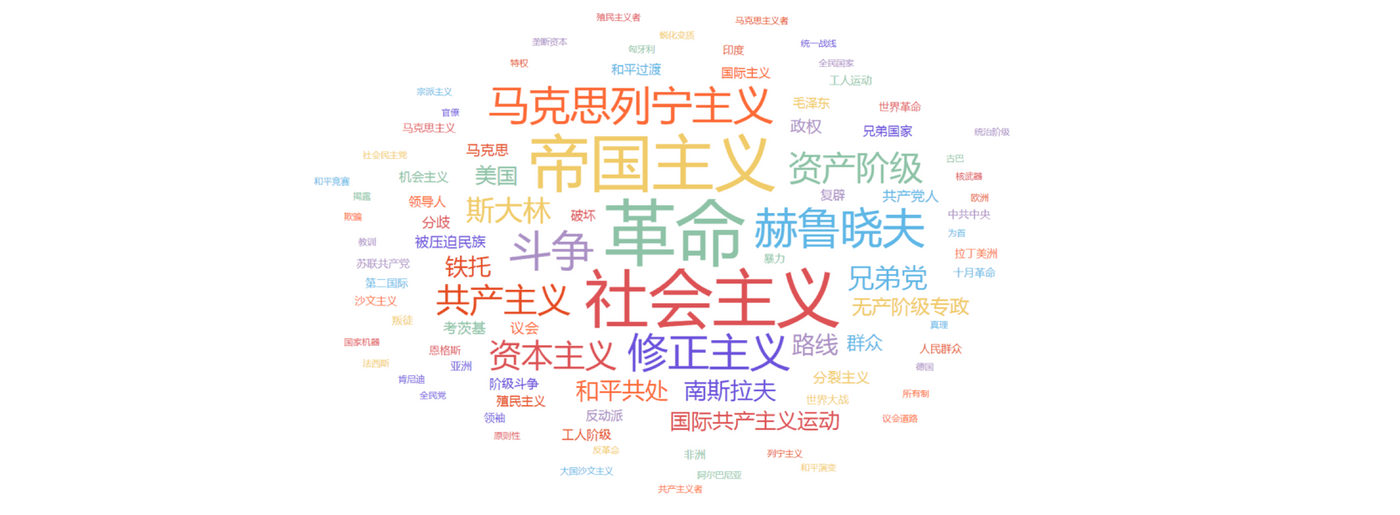
The most frequent is "revolution", which appears 778 times. "Khrushchev" appeared 443 times. "Revisionism" 421 times. "Dictatorship of the proletariat" 165 times. This group of words that repeatedly vibrated like alarm bells disciplined the consciousness of a generation, making it logical to join the frenzy of the Cultural Revolution. Some of the common phrases used in the Cultural Revolution also appeared in the Nine Commentaries: "new bourgeoisie," "ambitious, conspiratorial", "bourgeois legal rights", "two-line struggle", "big talk, big release, big debate" ” or even the “cultural revolution” (the term refers to the revolution of the ideological front, which is semantically close to but not identical to the later “cultural revolution”).
From 1964 to 1979, the life cycle of "Khrushchev revisionism" in the People's Daily was 16 years.
III . "Social Imperialism"
Related words: "Brezhnev", "New Tsar", "Social Fascism", "Million Chen Bing", "KGB", "Limited Sovereignty Theory", "International Dictatorship Theory", "Superpower"
"Socialism" and "imperialism", two life-and-death doctrines, can actually be merged into one. In 1968, the Soviet Union sent troops to Czechoslovakia, and the term "social imperialism" appeared in the People's Daily.
This term was used in the early years to condemn the social democracies of Western countries that "support imperialism in the name of socialism". Because it is not often used, my generation does not know it, and even hearing "social imperialism" on the radio is quite shocking.
In March 1969, an armed conflict broke out between China and the Soviet Union on Zhenbao Island in Heilongjiang. The PLA Daily on March 5 has a special relationship with me: this is my first day in the army.

The military camp erupted like a volcano. When the meal started, old and new soldiers speaking the dialects of Henan, Jiangsu, and Anhui took turns standing in the center of the dining hall, almost roaring, reading the letter of invitation, "Down with Soviet revisionist social-imperialism!" The slogan shook the roof. At that time, I felt that I was going to the front line tomorrow!
On August 13, 1969, the Sino-Soviet armed conflict broke out again in the Tielekti area of Yumin County, Xinjiang.
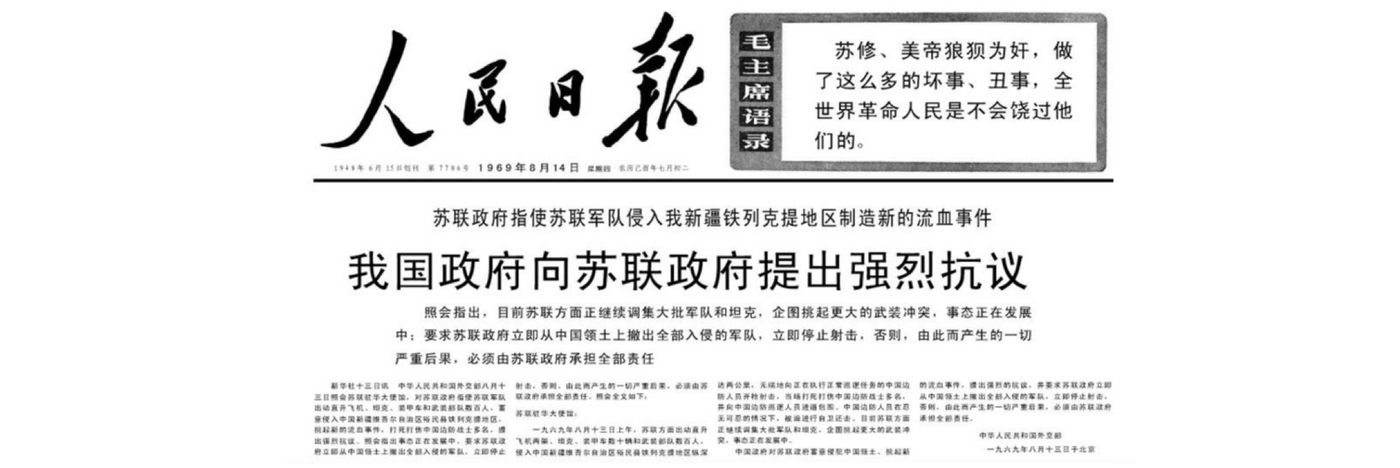
The People's Liberation Army suffered a big loss this time. The atmosphere of the barracks was far lower and tragic than that of the Zhenbao Island incident. The war seemed imminent.
On January 1, 1970, the New Year's Day editorial of the Party newspaper "Welcome to the Great Seventies" conveyed Mao's "latest instruction": "The people of the world unite to oppose any war of aggression launched by imperialism and social-imperialism, especially against the A war of aggression using the atomic bomb as a weapon! If such a war occurs, the people of the world should eliminate the war of aggression with a revolutionary war, and prepare from now on!”
April 22, 1970 is the 100th anniversary of Lenin's birth, here is the People's Daily on that day:
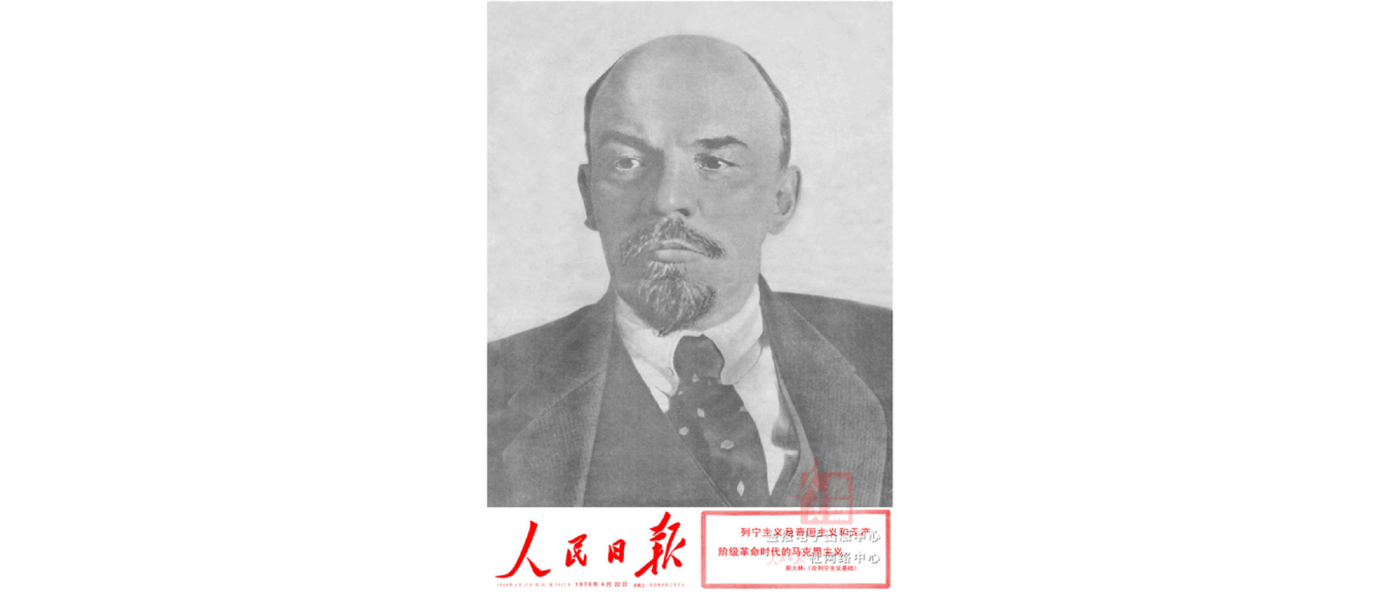

The Soviet Union has replaced the United States as the most dangerous enemy. The media began to use a whole new set of words to describe this former big brother: on the Sino-Soviet and Sino-Mongolian borders, the Soviet Union had "millions of Chen soldiers", ready to launch a surprise attack at any time (the warning of "the wolf is coming", which is divided into real and divided into two parts. The Soviet authorities are the "new tsars", under the banner of "limited sovereignty theory" and "international dictatorship theory", they bully the little brothers in Eastern Europe at every turn; they use the "KGB" and other terrible spy agencies, Suppression of its own people has degenerated into "social fascism"...
At that time, China was in deep civil strife during the Cultural Revolution. I am afraid that Mao Zedong did not expect that the "social fascism" that was originally attached to the Soviet revisionist's head became alienated in the process of dissemination and became a discourse weapon for the anti-Mao forces within the system and the anti-authoritarian forces of the people.
In 1971 "9.13", Lin Biao "exploded". During the campaign against Lin, the CCP announced the so-called Lin's "coup program" - "Minutes of the May 71 Project". This is a notebook confiscated from the Air Force, which contains a lot of anti-Mao and anti-Cultural Revolution remarks.

Contrary to Mao's prediction, seeing this material, a large number of young people, including educated youth sent to the countryside, not only did not incite hatred against Lin, but secretly applauded the words in the minutes—
The essence of their socialism is social fascism
They have turned China's state machine into a meat grinder that kills each other and pushes against each other.
Turn the political life of the party and the country into a feudal autocratic patriarchal life
The term "social fascism" also appeared in a 26,000-character poster titled "On Socialist Democracy and Legal System - Dedicated to Chairman Mao and the Fourth National People's Congress" on November 10, 1974 at the Beijing Road intersection in Guangzhou.
In this big-character poster against ultra-leftism, anti-authoritarianism, and calling for democratic rights, the author "Li Yizhe" wrote:
The social foundation of the capitalist roaders and careerists in the party is the nascent bourgeoisie hatched from privilege. Under the social conditions of modern China, they can only engage in feudal social fascist autocracy...
As early as the early 1960s, Chairman Mao warned the whole party and the whole people of the dangers of social fascism. He told us that if a country like ours were to be restored, it would not be an ordinary bourgeois dictatorship, "but it would be a reactionary, fascist-style dictatorship"...
The "social fascism" used in the "May 71 Project Minutes" and "Li Yizhe Big Character Poster" is an accurate and accurate description of reality. In fact, the systems of China and the Soviet Union as enemies are isomorphic. At that time, I didn't know that for many years we called Nazism "German Fascism", and the word "Nazi" also means "National Socialism".
The "social imperialism" in the People's Daily appeared in 1968 and disappeared in 1982, with a life cycle of nearly 14 years.
IV. Reform and new thinking
Related words: "Gorbachev", "Deng Xiaoping", "normalization", "openness", "social justice", "humanism", "8.19 coup", "Soviet disintegration", "Soviet communist party collapsed" "
In 1979, China and Vietnam fought a war, and I became a front-line reporter because of that. At that time we paid close attention to the movements of the Soviet Union. It was a deadly ground war with no air force cover - if our warplanes crossed the border, the Soviet Union could be involved and the war escalated.
In 1982, the People's Daily was still calling the Soviet Union "social-imperialism", while domestic politics had undergone profound changes; and changes in the Soviet Union were to come. Since this year, in the past four years, three general secretaries of the CPSU have died of illness, and Gorbachev came to power. With the normalization of state relations, a dramatic scene appeared in the mid-1980s. An exciting word drew together the former brothers and later mortal enemies of China and the Soviet Union: "reform".
In CCP media, this attraction has been downplayed. A large number of reports are mutual visits and negotiations. But in the intellectual world, information transmission and exchange about reforms have been more active than ever—this is my own experience.
In 1987, I participated in a delegation of Chinese writers to visit Suzhou, and the first issue of Reportage Magazine in 1988 left my record:

1987 marked the 70th anniversary of the October Revolution in the Soviet Union. This year, Gorbachev wrote "Reform and New Thinking").

The "painting style" of Soviet reform and Chinese reform is different. What attracts Chinese intellectuals is their top-down political loosening. For people in the media, this includes openness to speech driven by the slogan of "openness".
The outspoken weekly newspaper "Moscow News" was called "the flagship of reform" at the time. I proposed to visit and initially thought that they would apply for approval layer by layer. Unexpectedly, I called and replied within half an hour: Very welcome!
I went with the interpreter of the delegation, Professor Nan Zhengyun of Beijing Normal University, and I photographed this scene in front of the newspaper office:

In front of the newspaper column, people looked up to read an article entitled "Three Crisis of Gorbachev". The author uses the tone of discussion, but also criticizes the words. That scene shocked me. Years later, I said in "Southern Weekend" that my limited goal of pursuing journalistic ideals was to publish articles in Southern Weekly, such as "Comrade Jiang Zemin's Three Difficulties," which were discussed on an equal footing with leaders.
The People's Daily reported on the publication of "Reform and New Thinking", and the temperature was not high:


Magazines are more active. In 1988, the second issue of "Party Construction" magazine selected the contents of "Reform and New Thinking":

This is Peking University's "Political Research" report on the symposium:

The article published in the sixth issue of Qunyan in 1988 clearly pointed out that Ge's ideas could be used for reference.
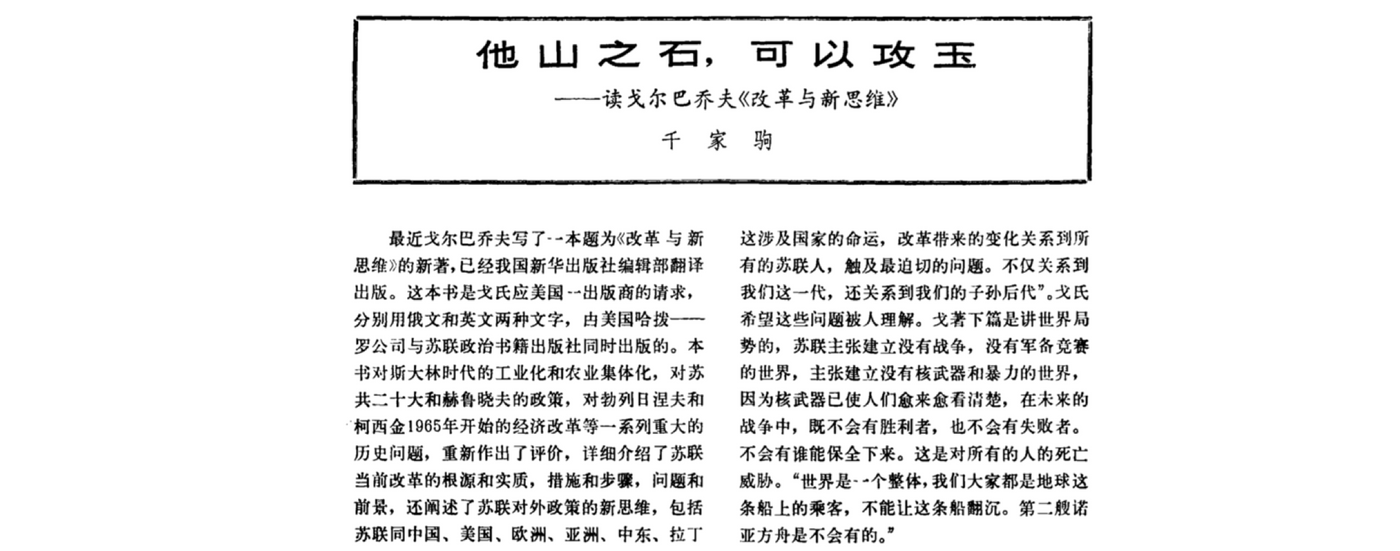
On May 16, 1989, marked by the meeting between Deng Xiaoping and Gorbachev in Beijing, China and the Soviet Union "ended the past and opened up the future" and normalized relations between the two countries.
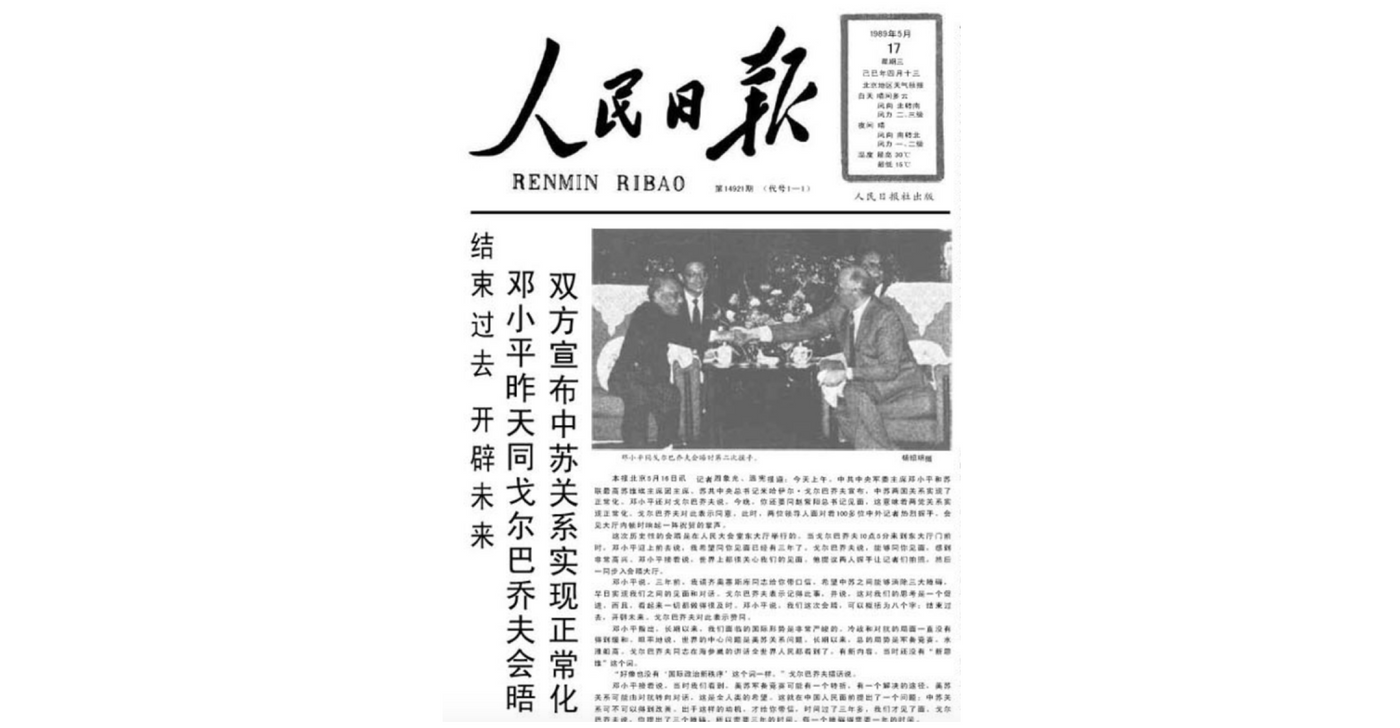
In addition to talking about state relations, the two leaders of communism reforms, which have attracted the attention of the West, had a dialogue on reforms. The conversation was overwhelmed by the uproar due to rapidly intensifying events not far from the meeting place.
There are at least three records of Dunge's reform dialogue. The text included in Deng's Selected "Ending the Past and Opening Up the Future" is roughly the same as the relevant passage in Gorbachev's memoir "Life and Reform".
Gorbachev did not expect that Deng Xiaoping would take the initiative to talk about his views on Marxism-Leninism. He said that in the Sino-Soviet debate that year, both sides talked a lot of empty words. Deng emphasized that it has been more than 100 years since the birth of Marxism, and great changes have taken place in the world, driving the emergence of new conditions in different countries. Marx himself could not answer many of the questions that arose after his death. Lenin was also incapable of answering all questions (quoted from "Outline of History" P449)
Deng talked about the reform of the political system. In the last sentence of "Ending the Past and Opening Up the Future," Deng said, "What he has not been able to achieve is the abolition of lifelong leadership positions. This is an important issue in the system."
The third record is from Ou Fuqin, an old reporter of the Soviet "Pravda" who is familiar with Chinese. He was Go's entourage at the time. He recalled:
... During the historic meeting between Gorbachev and Deng Xiaoping, I was not invited out of the meeting hall. I heard Gorbachev say: "Comrade Deng Xiaoping, I think we should bulldoze this political system and build a market economy from scratch! If we don't do this, all our reforms will be buried in the sand. Heap." Deng Xiaoping listened to him carefully and said, "I don't agree with you completely, Mr. Gorbachev. We are driving on a bumpy country road, which is the centralized planned economy. Two kilometers away can Saw a big modern highway - the market economy. To get to that road, we had to bump and sway on the muddy road for a while, so it was impossible without a steering wheel."
The above historical materials are from the article of "Neva Times" reporter Mikhail Churkin interviewing Ou Fuqin: "It is impossible without a steering wheel", translated by Yin Li.
In the spring and summer of 1989, Yura, a Soviet translator who accompanied me on my visit, was studying in Beijing. He was worried about my situation and looked for me everywhere. A few days later, when he saw me, he said, "Come on, the tanks are about to enter Moscow..."
On August 19, 1991, the "8.19 Incident" occurred in Moscow. People's Daily reported:
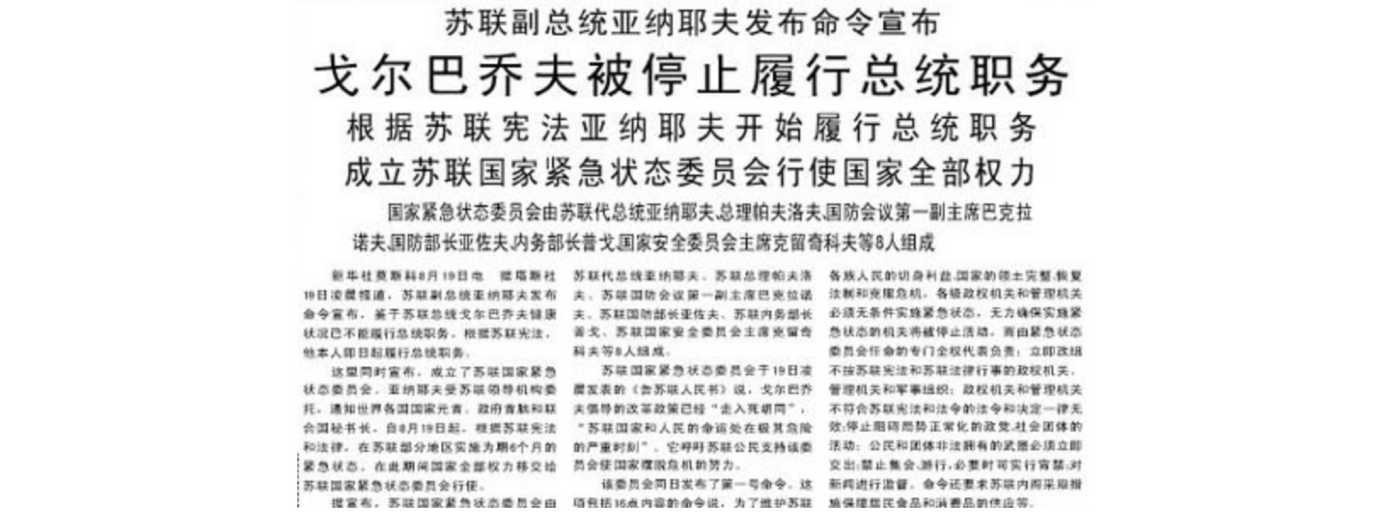
Judging from the tendencies of news language ("according to the Soviet constitution"), it is clear which side the Chinese party media is on.
"At the bridgehead of the Moscow River 100 meters away, there were 7 T-80 tanks parked," recalled Sheng Shiliang, a former Xinhua reporter in Moscow, "but I feel that the signs are not quite right, ... the tanks are red, white and blue. The tricolor flag, not the sickle and hammer red flag, I asked the soldier on the tank what was going on? He told me that Major General Lebed had already led us to 'change the flag' last night." Sheng recalled, "The branch The comrades on duty believe that this situation is contrary to domestic forecasts."
"On December 25, when Gorbachev announced the disintegration of the Soviet Union, no one was surprised, no one was sad, and everyone was calm." Wan Chengcai, former Xinhua News Agency bureau chief in Moscow recalled: "When the Soviet flag was lowered from the Kremlin, we rushed to Red Square, but nothing happened, everything was normal, but the reality was that a country disappeared. Although we had expected it, the Soviet people's It still surprised us if nothing happened." ( https://view.qq.com/a/20121024/000038.htm )
From 1987 to 1989, the life cycle of Gorbachev's "Reform and New Thinking" in the People's Daily was only 3 years. Since then, his name has appeared sporadically in the People's Daily, and articles have severely criticized "new thinking" and summed up the lessons of the Soviet Union's "destroying the party and the country". People in the party who insist on dictatorship have formed a consensus on "anti-government and defense".
Mao Zuo's website "Fuxing.com" recorded Deng Ge's dialogue, and even Deng also criticized it, saying that in the face of Ge's "bulldozer theory", "Deng Xiaoping was neither angry nor angry, neither criticized nor refuted, but discussed with the other party what to do. better" ( http://www.mzfxw.com/e/action/ShowInfo.php?classid=18&id=67982 )
V. "Strategic Partner"
Related words: "Yeltsin", "Jiang Zemin", "Putin", "Hu Jintao", "Xi Jinping"
From 1989 to 2019, China and the Soviet Union (China and Russia) issued 7 joint communiqués and 13 joint statements on bilateral relations. The key words of the communiqué and statement, 1989 is "normalization"; 1991 is "friendly, good-neighborly, mutually beneficial cooperation"; 1995 is "constructive partnership"; after 1996 is "strategic cooperative partnership".
In 2001, Jiang Zemin visited Russia and signed the Sino-Russian Treaty of Good-Neighborliness, Friendship and Cooperation with Putin (see the full text of the treaty in People's Daily on July 17, 2001). The treaty resolves a border issue that has entangled the two countries for years.
Li Fenglin, the former ambassador to the Soviet Union, said: "Tsarist Russia has occupied a large area of Chinese territory through unequal treaties. . It demands the recovery of the 1.5 million square kilometers of territory occupied by Russia. Now that the border issue has been completely resolved, the historical issue will no longer interfere with the relationship between the two countries.” (Preface to the History Outline)
People's Daily said: "Sino-Russian Treaty of Good-Neighborliness, Friendship and Cooperation" is different from the "Sino-Soviet Treaty of Friendship, Alliance and Mutual Assistance" in the 1950s. , not confrontation, not targeting third countries” (2002.7.14.3 version).
The most important "third country" is undoubtedly the United States. In fact, during the Clinton period from 1997 to 1998, China and the United States also called each other "constructive strategic partners". When George W. Bush came to power and positioned China as a "strategic competitor", Sino-US relations slid to a low point. And the warming of Sino-Russian relations has exceeded many people's expectations (or cautious vigilance).
In 2007, the word "comprehensive" was added in front of "strategic collaborative partnership". In 2013, a tidbit in the diplomatic news sent an unusual signal:
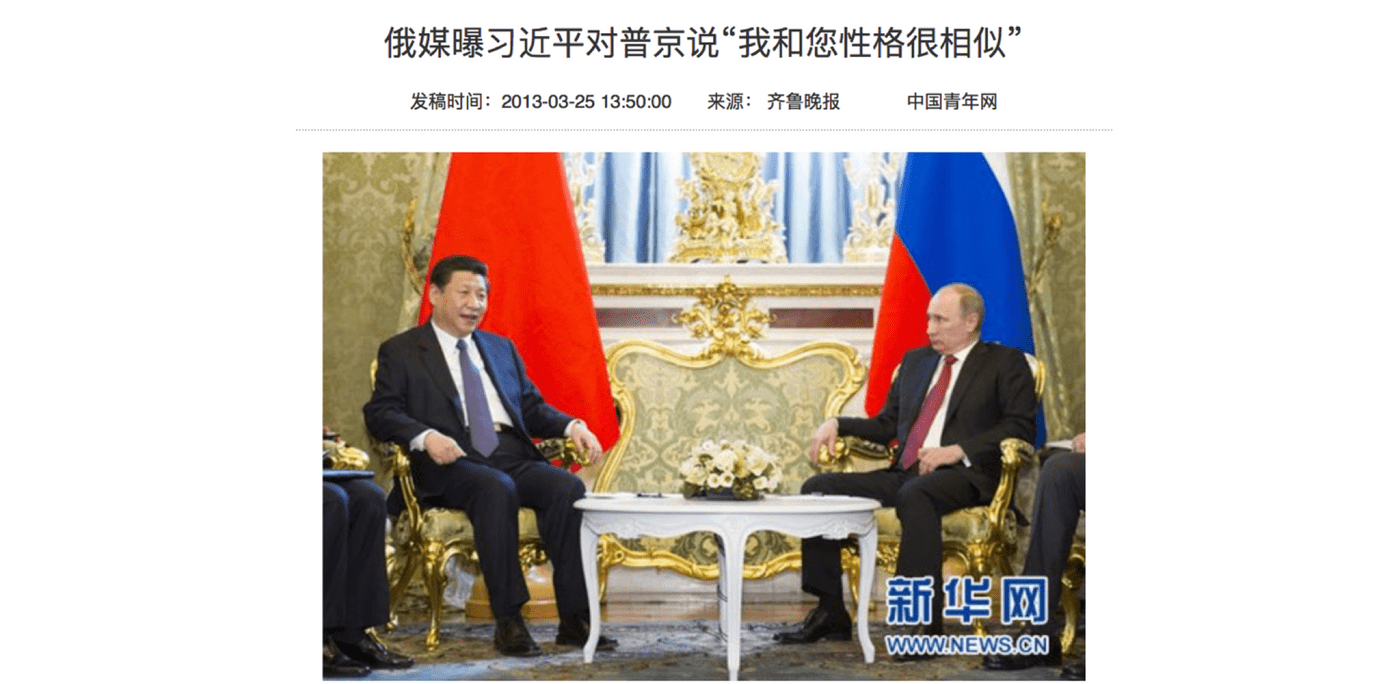
From 2013 to 2019, China and Russia issued a joint statement every year. Title of 2013: Joint Statement on Win-Win Cooperation and Deepening Comprehensive Strategic Partnership; 2014: Joint Statement on the New Stage of Comprehensive Strategic Partnership; 2015: Joint Statement on Comprehensively Deepening Strategic Partnership and Advocating Win-Win Cooperation; 2016: No modifier before "Joint Statement"; 2017: Joint Statement on Further Deepening Comprehensive Strategic Partnership of Collaboration; 2018: No modifier before "Joint Statement"; 2019: Joint Statement on Developing Comprehensive Strategic Partnership for the New Era statement.

In the political dictionary after the 19th National Congress of the Communist Party of China, "new era" means "Xi era". This newly added symbol emphasizes: Sino-Russian relations are an important layout of Xi Jinping's international chessboard. The People's Daily described Sino-Russian relations as "good neighbors that cannot be removed, and true partners that cannot be dismantled."
In 2016, shortly before Xi gained "core" status, someone noticed the latest developments in Sino-Russian military relations:
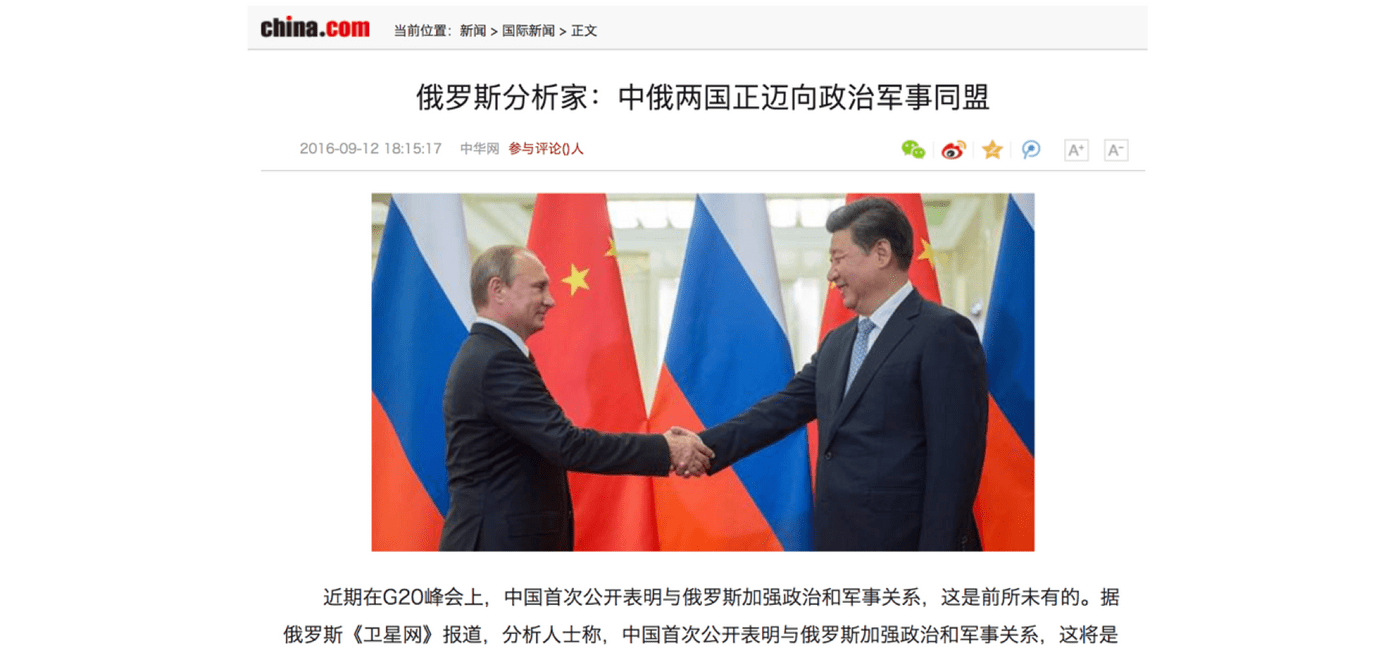
Jiang Zemin took office, and Sino-Russian military relations have begun to take shape. The Sino-Russian joint statement issued on November 12, 1997 stated: "Developing relations in the field of military technology is an important part of bilateral cooperation."
Hu Jintao took office, and the Sino-Russian joint statement issued on June 7, 2012 stated: "To enhance the traditional friendship between the two militaries, to deepen the cooperation between the two militaries at all levels and in various fields, and to carry out activities aimed at improving the coordination capabilities of the two militaries and promoting regional peace, security and security. Stable joint military exercises."
In 2013, 2014, 2015, the three joint statements made no mention of military cooperation.
The 2016 Sino-Russian Joint Statement proposed to "develop Sino-Russian military exchanges and cooperation, strengthen the traditional friendship between the two militaries, and regard it as an important part of the Sino-Russian comprehensive strategic partnership of coordination."
The 2017 Sino-Russian Joint Statement proposed "to develop exchanges and cooperation in the field of military and military technology, strengthen military mutual trust, promote the continuous deepening of the existing cooperation mechanism between the two militaries, and jointly respond to regional and global security threats."
The 2018 Sino-Russian Joint Statement stated that "China and Russia are willing to continue to strengthen strategic communication and coordination between the two militaries, improve the existing cooperation mechanism between the two militaries, expand practical cooperation in the field of military and military technology, and work together to address regional and global security challenges."
The Sino-Russian joint statement published by the People's Daily on June 6, 2019 stated: "Continue to strengthen strategic communication between the defense departments and militaries of the two countries, deepen military mutual trust, strengthen cooperation in the field of military technology, conduct joint military exercises, and improve practical cooperation at all levels and in all fields. mechanism to promote the relationship between the two militaries to a new level."
"(Sino-Russian) strategic cooperative partner" has been used in People's Daily for 22 years since 1996, surpassing the 4 hats after 1949. If the "political-military alliance" becomes a reality, the "non-alignment" principle of the Sino-Russian Treaty of Good-Neighborliness, Friendship and Cooperation, which expires in 2021, will be broken. Déjà vu Yan Returns?
VI. Word life overview
Five hats, strung together the history of Sino-Soviet (Russia) relations since 1949. The "Shouxing Language" in the middle is none other than "Leninism". The life cycle of "Five Hats, One Flag" in the People's Daily is as follows:
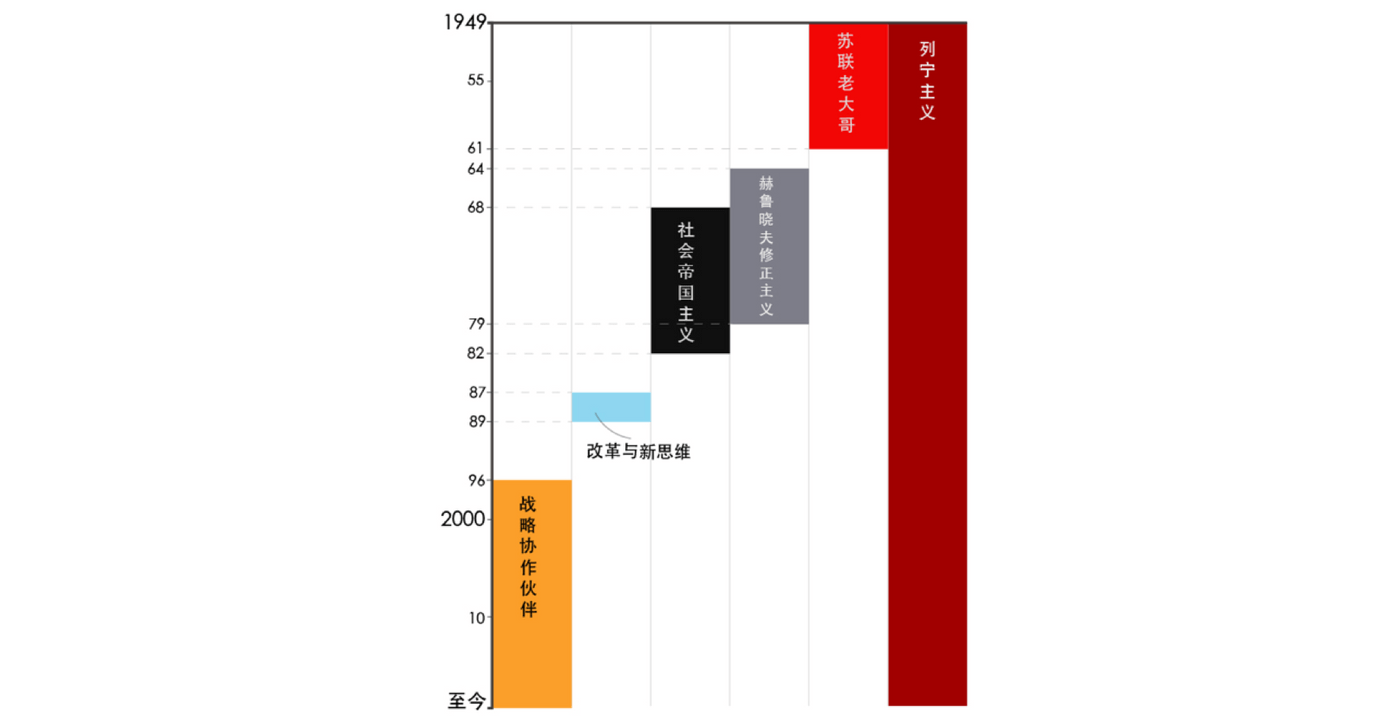
"Lenin", "October Revolution", "Leninism", these words were originally the link between the Chinese and Soviet parties and the two countries. But in a period of broken relations, "Leninism" was precisely the CCP's sharp edge against the CPSU. The violent revolution at the heart of Leninism, the dictatorship of the proletariat, has been abandoned in Russia. In China, the opposite is true.
No one will regard Putin as the successor of Lenin. As we all know, Putin will inherit Ivan the Terrible and Peter the Great. If you want to know Putin's attitude towards Lenin, you can find a lot of information by searching "Putin Lenin". On May 5, 2005, Putin said in an interview with German TV stations ARD and CDF: "Liberation from dictatorship does not necessarily accompany the disintegration of the country. . . . People who do not regret the collapse of the Soviet Union have no conscience, but People who want to restore the Soviet Union have no brains."
These words are not original to Putin. After the disintegration of the Soviet Union, many officials and well-known figures, including Russian President Yeltsin, Kazakhstan President Nursultan Nazarbayev, and former Ukrainian President Kuchma, have said similar things.
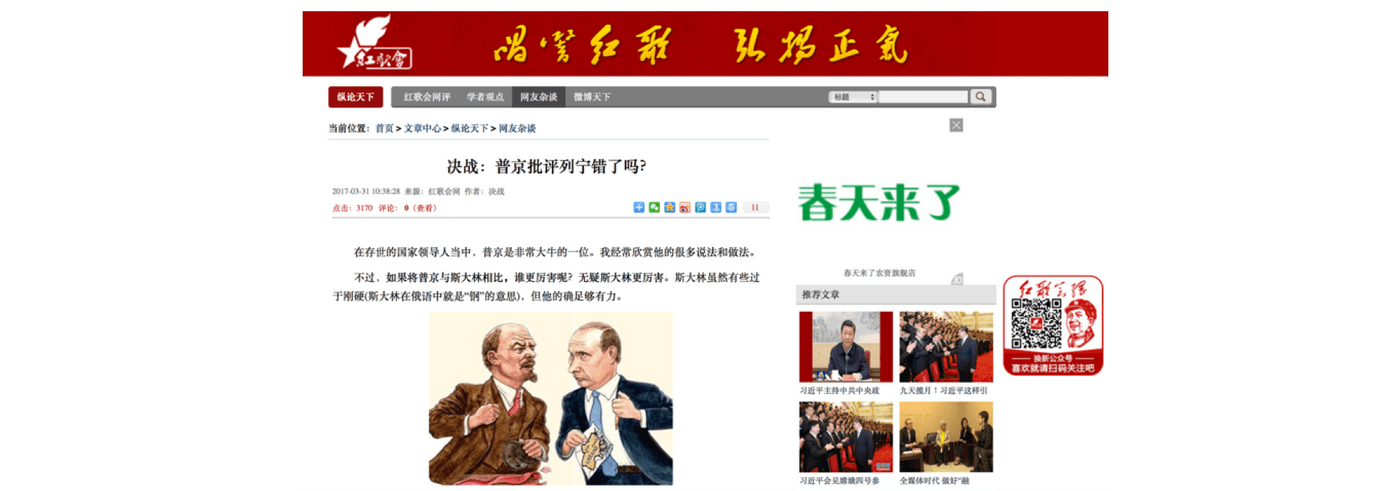
The above page shows that Chinese Mao Zuo is not confused: Lao Pu is not his own.
There will always be wishful thinking. To commemorate the 40th anniversary of reform and opening up at the end of 2018, the People's Daily quoted Pravda's article "October Light Guides the Future" on the 100th anniversary of the October Revolution twice on December 14 and 16, saying that the article pointed out that "China's achievements make People still look to the 'October Lights'".

I checked the article. The article was published on November 7, 2017 by Dyuganov, Chairman of the Russian Communist Party. The sentence quoted by the People's Daily was not included in the article. The author wrote this:
The main result of today's October Revolution, the Soviet Union, no longer exists, and we have failed to cherish it. It was betrayedly damaged. Time does not stand still, capitalism moves from crisis to crisis. It breeds terrorism and starts new wars. The only way out of desperation is socialism, and this is not utopia. The legacy of the October Revolution has inspired many countries. China and Vietnam have made great achievements. Cuba, North Korea, and Venezuela are still persevering. The experience of the Belarusian brothers is instructive. (Translated by Yin Li)
Zyuganov has run for president four times. He leads the opposition party. He is free to express dissent in the media. All this shows that today's Russia is by no means the Soviet Union of yesterday, and its "character" is also quite different from China's. Chairman Zyuganov attributed the great achievements of China's reform and opening up to the October Revolution, which is very useful to those who want both a dictatorship and a market; but it is embarrassing that he regards China as the same as North Korea and Venezuela.
In fact, as Professor Zhu Xueqin said, Marxism-Leninism has become Market-Leninism. According to the standard for measuring the language temperature of the party media of the China Media Research Program, the language temperature of "Leninism" in the People's Daily in the 1950s was hot, in the 1960s it was boiling, in the 1970s it was close to boiling, and in the four decades starting in the 1980s, the language temperature dropped. For heat:
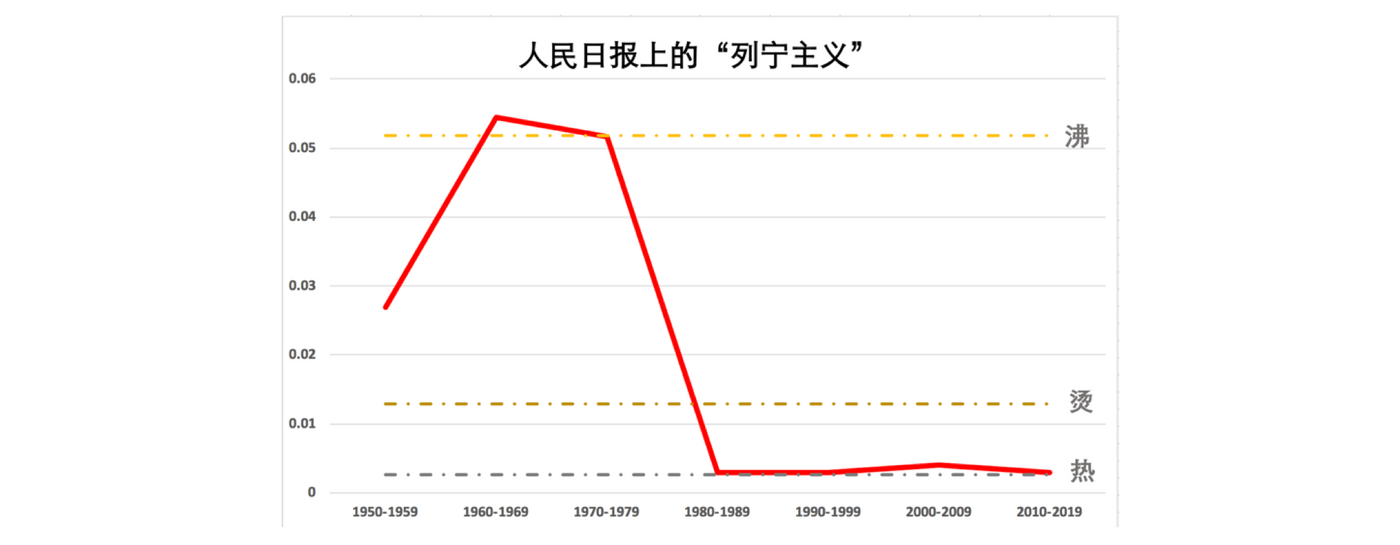
Boiling and scalding are a thing of the past, and the enthusiasm for doctrine still exists. Like the political system, it belongs to the category of "resolutely do not change what should not be changed, and what cannot be changed." Under this general framework, where will China-Russia relations go?
Like my work? Don't forget to support and clap, let me know that you are with me on the road of creation. Keep this enthusiasm together!
